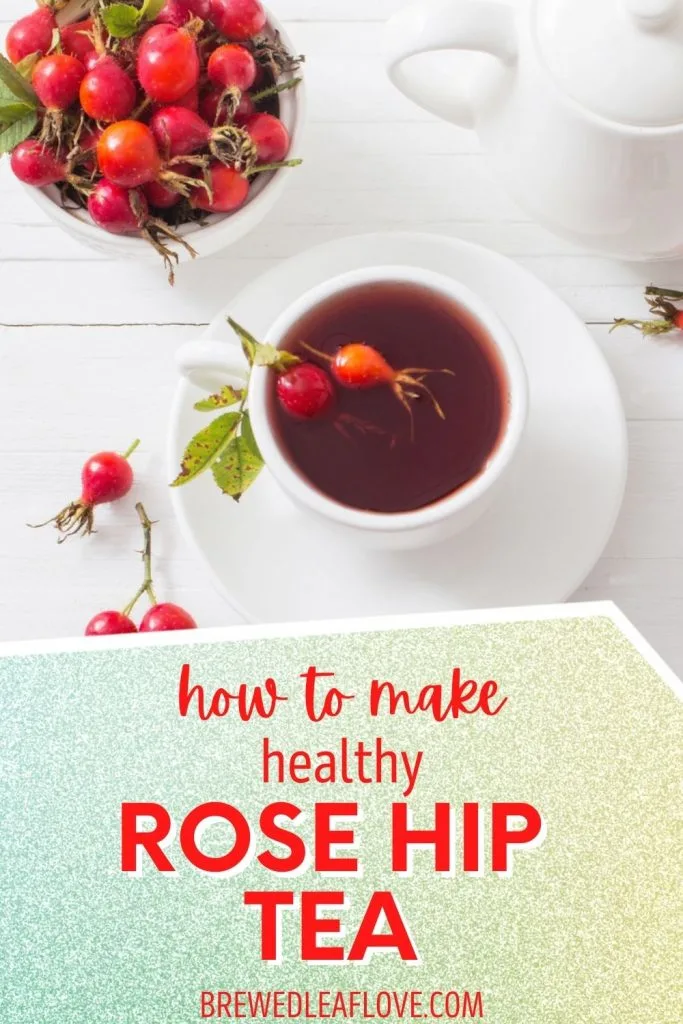Roses are one of the most popular garden flowers in the world, but did you know that they can be used to make tea? Rosehips, or the unblossomed fruits of the rose bush, can be brewed into a healthy tea that is also delicious.
Rose hip tea is an herbal tea brewed from the fruits of the rose bush. The roses of the climbing species Rosa canina (dog rose) have been studied for medicinal properties. Rosehip tea can be grown at home with some difficulty, but rosehip tea can also be purchased commercially.
Rosehip tea can have several positive impacts on your health. However, you need to know how to brew it correctly for optimal nutrition. Read on to learn more about rosehip tea and how to make it.
What Is Rosehip Tea?
Rose hip tea is made by steeping rosehips in boiling water. No surprise, huh?
The rose hip is the part of the rose blossom just below the petals. It contains the seeds of the rose plant and is usually about ½ inch in diameter. They’re usually red or orange, but can range much darker in some rose species.
While rosehip tea is called a tea, this steeped botanical drink is actually a tisane. A tisane is a beverage made by steeping plant matter such as fruits, leaves, roots, or flowers in boiling water until an infusion is made.

What Does Rosehip Tea Taste Like?
Rosehip tea is known for a slightly sweet, tart flavor and a strong floral perfume. Some people may find rosehip tea more palatable when sweetened with sugar or honey to combat its astringent notes.
Health Benefits of Rosehip Tea
People drink rosehip tea for both its flavor and its medicinal properties. Here are just a few of the health benefits associated with rosehip tea:
- Vitamin C: Rosehips are a good source of Vitamin C. This essential vitamin helps the body repair wounds, destroy free radicals, bone growth, and healthy skin.
- Reduced blood sugar levels: Rosehip tea can help reduce and stabilize high blood sugar levels. This can be helpful for people who need help balancing their blood sugar, such as those who are hyperglycemic or have type 2 diabetes.
- Heart health: The chemicals in rosehips prevent plaque in blood arteries that can cause cardiovascular diseases such as stroke or heart attack.
- Healthy antioxidants: The large amounts of Vitamin C in rosehip tea make them a good source of healthy antioxidants. Antioxidants help reduce free radicals in the body and prevent degenerative diseases like cancer and Alzheimer’s.
- Immune system boost: Along with providing antioxidants, the Vitamin C in rosehip tea also helps bolster the immune system. This helps prevent opportunistic infections like the common cold.
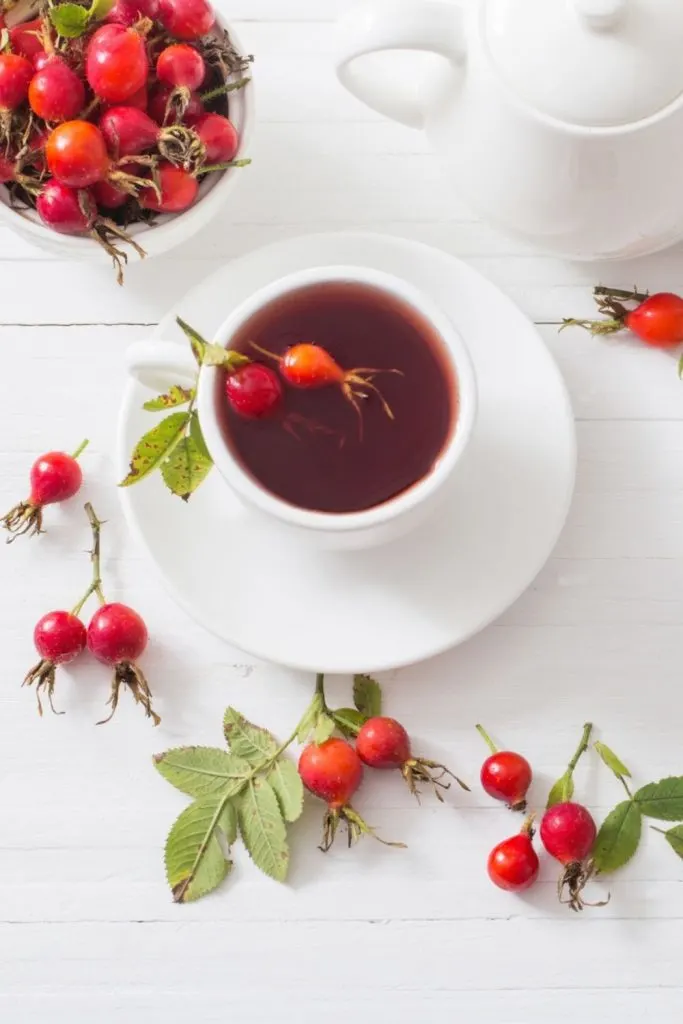
Rosehip tea can provide plenty of advantages for your health if you drink it regularly. If you don’t like the taste of rosehips, they can be mixed into an herbal tea blend with other more palatable aromatic herbs, such as peppermint.
What Are the Side Effects of Drinking Rosehip Tea?
Even though rosehip tea is considered safe to drink for most people since roses are edible, drinking rosehip tea can still cause negative side effects if you have an unknown allergy to roses.
If you experience any negative side effects of drinking rosehip tea such as swelling, hives, shortness of breath, or nausea, stop drinking the rosehip tea and consult a doctor. Allergies to rose hip tea are generally rare, so chances are you’re safe to drink as much as you like!
Is Rosehip Tea Safe During Pregnancy?
Despite the health benefits of this tea, it’s always recommended to talk to your health care provider before consuming any new food or beverage during pregnancy. To date there have been no studies on the effects of rosehip tea during pregnancy, so definitely discuss this with your doctor.
Can You Grow Rosehip Tea?
It’s possible to grow roses to make your own rosehip tea. However, the major challenge with growing roses for tea is that roses are a high-maintenance garden plant that tend to have issues with both insects and disease. This can make growing roses for tea somewhat challenging for people who don’t have previous gardening experience.
If you grow your own rosehips, it’s important to remember that you shouldn’t use insecticides or other chemicals on the plants. Organic gardening is more challenging with roses, but you need to avoid using potentially toxic chemicals on rosehips that you plan to process for herbal tea.
If you already have established rose plants, especially those of the wild variety (Rosa canina), by all means give it a go, but make sure the hips are never treated with insecticides.
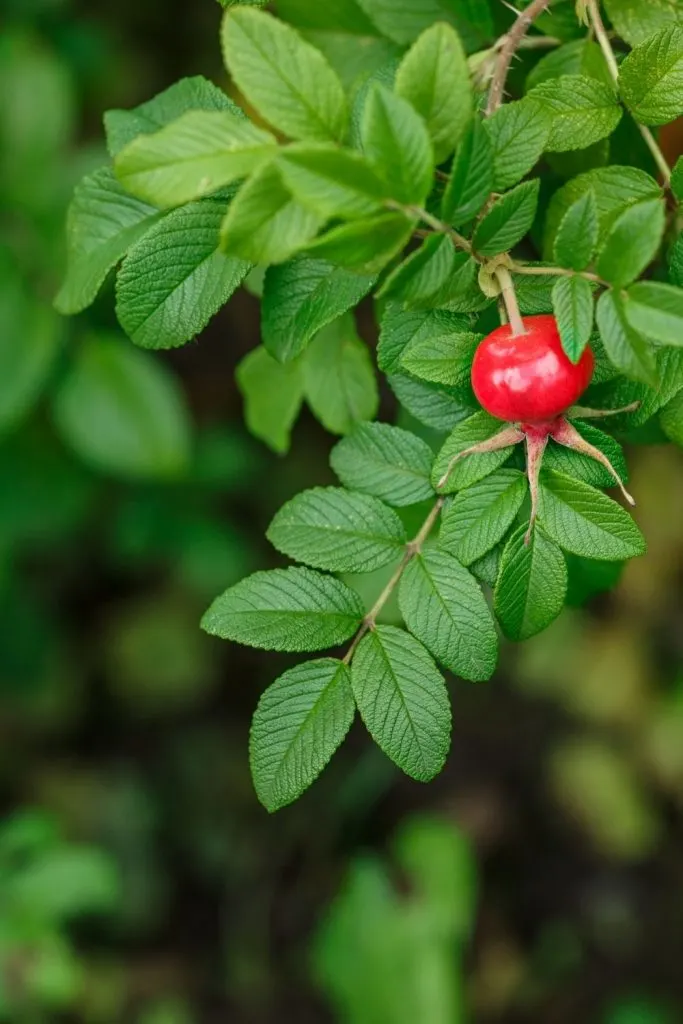
How to Grow Rosehips For Tea
Growing rosehips for your herbal tea garden may be more difficult than growing other types of herbs such as sage or mint, but it can still be done with a little diligence and practice. Here are some tips for growing roses for rosehip tea:
- Choose cultivars that produce rosehips. Not all subspecies of rose produce edible rosehips due to modern hybridizing, so go with an old-fashioned cultivar or a briar rose to grow plenty of rosehips to work with. The best to try is the Rosa canina, or dog rose.
- Choose good growing conditions. Roses need full sun and well-draining soil with plenty of ventilation to prevent disease. This becomes even more important when you grow organic roses for tea.
- Gather rosehips at the right time of year. The best time to collect rosehips is after the first frost of the year. This will soften the rosehips and make them easier to brew for rosehip tea.
Rosehips are a nice by-product of your garden roses if you already have a rose garden. Consider leaving some of your rosehips on the rose bushes to help feed your backyard wildlife over the winter.
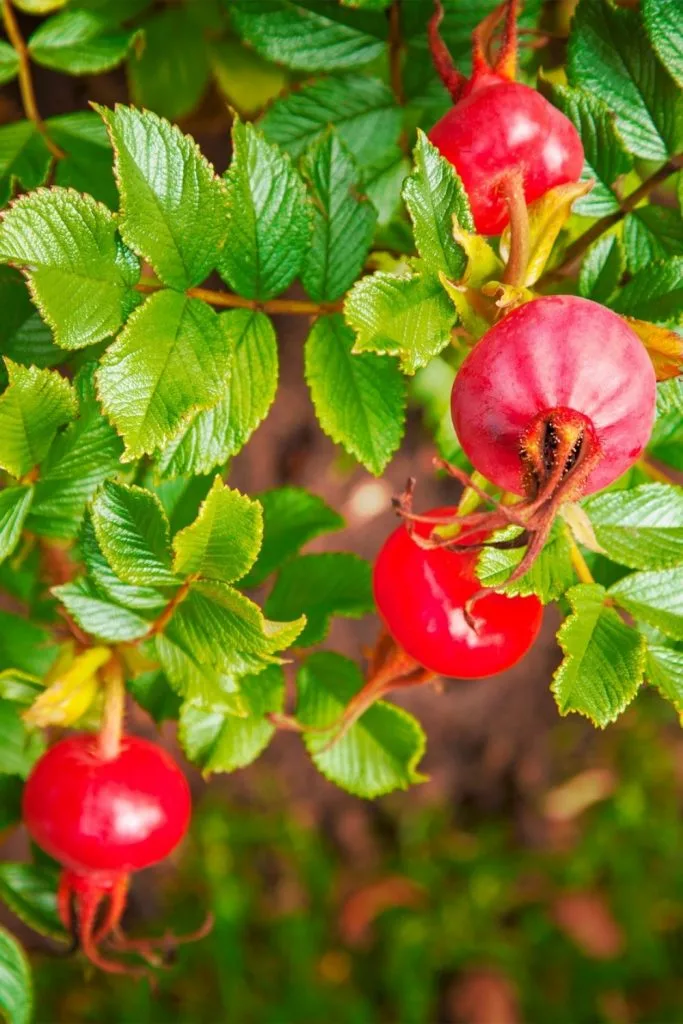
Rosehip Tea Recipe
Rosehip tea can be brewed from dried or fresh hips. Like other herbal tisanes, rosehip tea requires a long steeping time to get a potent liquor.
Tea from Dried Rose Hips:
- Add 1 tablespoon of dried crushed organic rose hips to a mug
- Pour over 1 cup of boiling water
- Steep for 15-30 minutes
- Strain and sweeten if desired.
Tea from Fresh Rose Hips:
- Wash fresh rosehips well and cut in half.
- Add about ¼ cup of cut up hips to a mug
- Add 1 cup of boiling water
- Steep for 15-30 minutes
- Strain well and sweeten if desired.
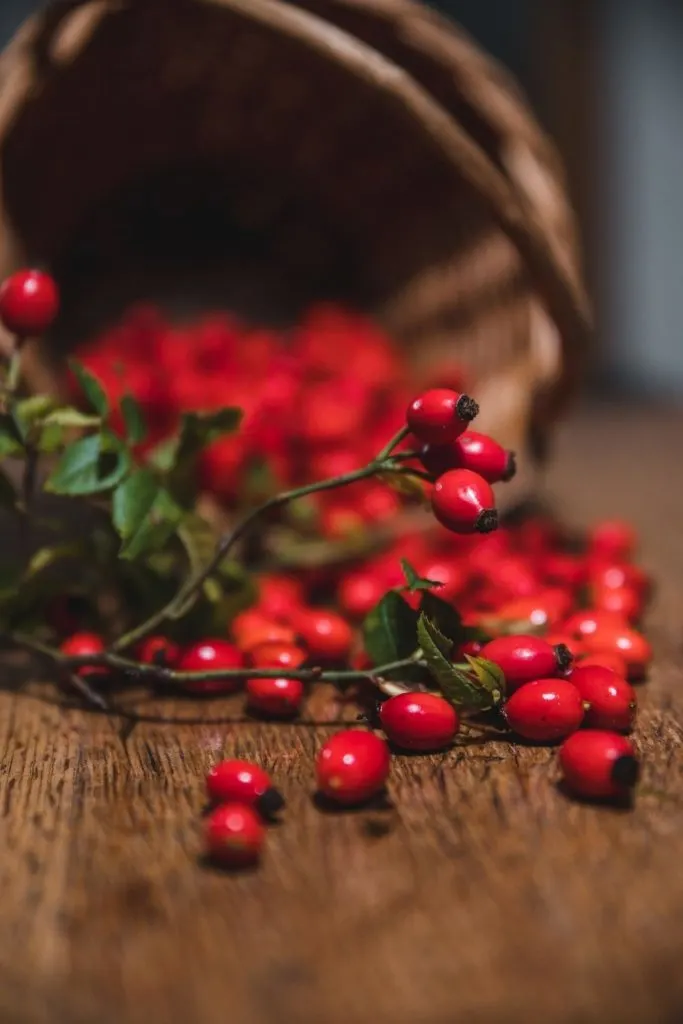
What Else is Rosehip Used For?
Edible rosehips are used widely around the world for a variety of culinary as well as crafty uses:
- Brandy
- Soft drinks
- Jams and jellies
- Syrups
- Potpourri
- Teas in blends like rosehip and hibiscus tea
Rosehips Pack a Healthy Punch
Roses are known throughout the world for their beauty and perfume, but many people aren’t aware of the hidden benefits of rosehips. Try preparing this dry, aromatic tea and learn to appreciate roses in a whole new way!
